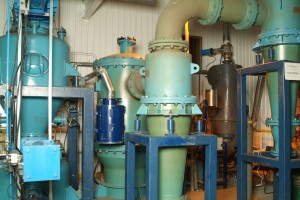
An increasing number of companies are trying to convert waste into sources of energy and heat. According to the Green Economy Post, currently there are 431 waste-to-energy (WTE) plants in Europe and 89 in the United States, where 14 per cent of the country’s trash is recycled in WTE plants.
Case study
Turning waste into fuel is the Holy Grail that Montreal-based Enerkem has been pursing over the last seven years. Earlier this month Enerkem announced it had received US$60 million in new financing from oil refiner Valero, who has joined existing investors Waste Management, Rho Ventures, Braemar Energy Ventures and Cycle Capital.
Enerkem now has US$130 million in investments. Enerkem currently operates two facilities in Quebec and in 2010 began construction of a municipal waste-to-biofuels plant in Alberta. Later this year, Enerkem expects to break ground on a similar facility in Mississippi for which it is receiving financial support from the USDA and U.S. Department of Energy.
Enerkem’s goal is to develop a clean technology that transforms sorted municipal solid waste (MSW) as well as forest and agricultural residues into advanced ethanol, and high-value chemicals such as acetates.
These materials contain carbon molecules that can be chemically recycled into what the company calls “value-added productsâ€. The process complements traditional recycling and composting.
“We call our process carbon recycling. We chemically recycle carbon that is trapped in waste destined to landfills. Value is therefore extracted from non-recyclable waste as this lost carbon is converted into a new line of transportation fuel and advanced chemicalsâ€, the company says.
Enerkem inaugurated its pilot plant in 2003 and the technology developed since then is now applied at its first commercial plant in Westbury, Quebec. The process is a combination of green gasification and catalytic synthesis involving heat, pressure, advanced chemistry and the use of proven catalysts. Extensive gas conditioning produces a tailored syngas that is then transformed into premium products using established and readily available industrial catalysts at the proper temperatures and pressures.
Besides the obvious benefits of turning waste into alternative energy, Enerkem says its process is also environmentally-friendly. First, it is energy efficient, as the chemical reactions during the thermal phase of the process produce most of the energy and heat needed. Water usage is economical as well, as most of it is reused in a closed circuit. Air quality is protected as the thermochemical conversion of the raw materials is conducted in enclosed vessels to protect carbon molecules. Finally, the company says its plants are compact, decentralized and located near the raw material supply sites.
You should follow us here.





